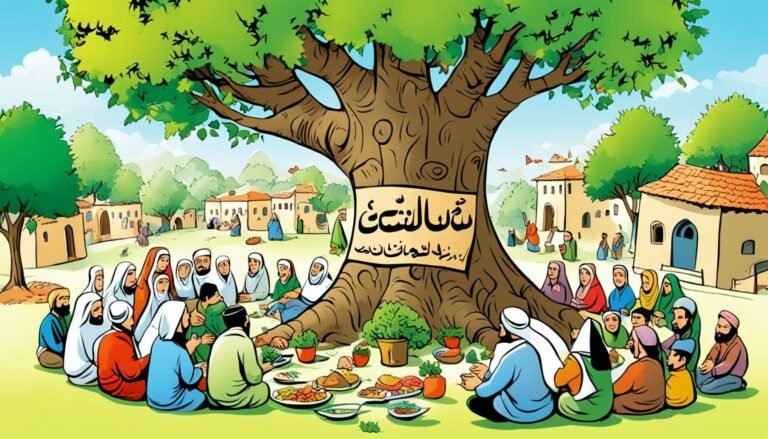From Tradition to Controversy: The Role of Hadith in Shaping Islamic Law
Have you ever thought about how thousands of sayings from the Prophet Muhammad guide everything from daily life to laws in nearly fifty Muslim-majority countries? The Hadith’s role in shaping Islamic law is both fascinating and debated today.
We’ll look into the importance of Hadith and how it connects with Islamic law. It affects spiritual and everyday life for millions. Yet, questions about its truth, new interpretations, and different uses bring up big debates about its place in today’s world.
Let’s dive into the complex role of Hadith in Islamic law and its changing nature.
Key Takeaways
- Hadith is a key source for Islamic law, guiding laws in many Muslim-majority countries.
- Traditional views of Islamic law often call for harsh punishments, sparking debate.
- Sharia, based on the Quran and Hadith, has different interpretations among scholars.
- Some countries have laws that discriminate against LGBTQ+ individuals, showing the complex use of Islamic law.
- Women’s rights under Islamic law are limited in many places, sparking more debate.
- There are different views on how sharia can work with modern democratic values.
Introduction to Hadith and Islamic Law
The Introduction to Hadith is key to understanding its role in Islamic Law. Hadith includes the Prophet Muhammad’s sayings, actions, and approvals. It’s as important as the Qur’an in Islamic jurisprudence. The Qur’an gives divine guidance, and Hadith explains and details its legal verses.
In Islamic Law, known as Shari’a, Hadith is more than just a supplement. Scholars argue about its authority and how it relates to pre-Islamic culture and Shari’a. This shows how history and culture affect legal interpretations.
Muslim scholars see Hadith as vital in shaping legal discussions. They explore how culture impacts Islamic laws. This shows why studying Hadith is important for understanding both history and today’s implications.
Understanding the Hadith: Definition and Importance
To understand the definition of Hadith, it’s key to see it as a collection of the Prophet Muhammad’s sayings, actions, and approvals. These records are more than just historical accounts. They guide Muslims in ethics and practices. They’re crucial for Islamic law, as the Quran has few legal verses.
Hadith play a big part in everyday life. They give clear advice on religious acts, social behavior, and legal issues. For example, the Sunni Kutub Al-Sittah and Shia Al-Kutub Al-Arb’ah show how wide-ranging these texts are. Works like Sahih al-Bukhari and Sahih Muslim are key. They check Hadith for truth, classifying them as sahih (true), hasan (good), or da’if (weak).
Not everyone sees Hadith the same way. Some, like the Kharijites, don’t accept them, causing splits in the Islamic world. Western scholars also question their trustworthiness, doubting their accuracy over time.
Looking at it all, the Hadith significance goes beyond stories. They share the early teachings and ways of Islam. They help Muslims live by their faith’s principles.
The Development of Hadith as a Source of Islamic Jurisprudence
The Hadith’s development is key to Islamic law, shaping it after the Prophet Muhammad’s death. Early Muslims saw the need to keep his teachings to uphold Islamic law. This led to a big push in collecting Hadith, using different methods to sort them by how true they are.
Historical Context of Hadith Collection
The history of collecting Hadith is full of important work, especially from figures like Abu Huraira, who gathered over 5,000 Hadith. His work set a standard for others, showing the need for a careful approach to saving Hadith. Since then, collecting Hadith was done mainly through oral tradition, requiring careful checks to keep it accurate and true.
Major Compilations: Sahih al-Bukhari and Others
Sahih al-Bukhari is a major work in Hadith studies, with over 2,000 verified Hadith. Scholars sort Hadith into categories like sound, weak, and false ones. They look at the chain of who passed down the Hadith to check if it’s true. Sunni Muslims mainly use four big collections for trusted Hadith: Bukhari, Muslim, Abu Dawud, and Tirmidhi.
| Classification | Description |
|---|---|
| Sound (Hasan) | Authentic Hadith with reliable chains of transmission. |
| Weak (Da’if) | Hadith with potential reliability issues. |
| Fabricated (Mawdu’) | Hadith known to be false or inauthentic. |
| Mutawatir | Hadith reported by a large number of witnesses. |
| Mursal | Hadith missing a link in the transmission chain. |
This system shows why Sahih al-Bukhari is so important, thanks to its strict checks. Issues like fake or changed Hadith highlight the need to carefully check sources. The mix of culture and Islamic law affects how we see and use Hadith today, showing its big impact on law and faith.
From Tradition to Controversy: The Role of Hadith in Shaping Islamic Law
The Hadith is very important in Islamic law. It helps shape the laws that Muslims follow. It’s the second main source of law after the Quran. Hadith explains the Quran and helps us understand the laws of Shari’a.
This link between Hadith and the Quran is key for making legal decisions. It helps Muslims in different places apply the laws correctly.
Hadith and Its Significance in Islamic Law
For many years, Hadith has shown it can change with society. Scholars use Hadith to make laws for today’s problems. This keeps the teachings of the Prophet Muhammad up to date.
Hadith is important for more than its history. It affects laws in almost fifty Muslim-majority countries today.
The Interplay Between Hadith and the Quran
The Hadith and Quran work together in Islamic law. The Quran sets the basic laws, and Hadith adds details. For example, Hadith talks about social justice, marriage, and how to act every day.
These two sources are crucial for a full legal system. Scholars use both to answer tricky legal questions.
Hadith Interpretations in Various Islamic Schools of Thought
Different Islamic schools of thought have their own ways of understanding Hadith. This shows the complexity within the Muslim community. The difference between Hadith and Sunnah is key in these interpretations. It affects how Islamic law is seen and followed across traditions.
Sunnah vs. Hadith: Clarifying Terms
The terms *Sunnah* and *Hadith* are often used together, but they mean different things in Islamic law. Hadith are reports about what the Prophet Muhammad said or did. Sunnah is the broader set of customs and practices based on these Hadith and the Prophet’s life. This clear distinction helps different schools focus on certain parts of Hadith, shaping their laws and ethics.
The Influence of Hadith in Sunni and Shia Traditions
Sunni and Shia views on Hadith show big differences in Islamic law. Sunnis mainly use Hadith collections like the Kutub Al-Sittah. These focus on the Prophet’s sayings and actions. Shia Islam, on the other hand, includes sayings of the Ahlul Bayt, believing in their divine leadership.
How Hadith are classified as sahih (authentic), hasan (good), or da’if (weak) affects these interpretations. It shapes legal decisions and theological views in different groups. Here’s a summary table:
| Category | Sunni Approach | Shia Approach |
|---|---|---|
| Sources of Sunnah | Sahih Bukhari, Sahih Muslim | Saying of Ahlul Bayt |
| Classification of Hadith | Sahih, Hasan, Da’if | Sahih, Maqbul (acceptable) |
| Legal Authority | Predominantly from Hadith | Incorporates Ahlul Bayt over Hadith |
| Key Scholars | Imam al-Bukhari, Imam Muslim | Sheikh al-Kulayni, Sheikh al-Tusi |
These differences show the varied interpretations in Sunni and Shia Islam. They highlight how Hadith interpretations deeply affect legal decisions and practices. Understanding these differences enriches discussions on Islamic law and shows the diversity in Islamic traditions.
Controversies Surrounding Hadith Authenticity
Debates over Hadith authenticity are complex and often contentious. Scholars have spent their careers checking the truth of various narrations. This has led to big debates about Hadith trustworthiness. Worries about making things up and political bias have made these discussions important.
Debates on Fabrication and Political Influence
Many have accused of making up Hadith over the years. This has led to a deep look into how Hadith were collected. Scholars like Muhammad al-Bukhari checked about 600,000 stories before picking around 7,400 for his book. This shows how hard it is to know what’s real.
Bukhari often looked at the last person telling the story, which has sparked debates. As Islam split into different groups, these biases and manipulations grew. This made the trust in Hadith reports shaky.
Major Scholars and Their Contributions to Hadith Authentication
In the 10th century, the Sahihayn, by Bukhari and Muslim, became key texts for Sunnis. They set a standard for checking Hadith truth. Later, more books like Sunan Abi Dawud and Sunan al-Nasa’i were added, making six main books by the 12th century.
This method of checking Hadith has been a big part of scholarly talks. It shows a careful way to check Hadith truth that has lasted.
| Scholar | Era | Contributions |
|---|---|---|
| Muhammad al-Bukhari | 9th century | Developed stringent criteria for Hadith inclusion; compiled around 7,400 authentic narrations. |
| Sahih Muslim | 9th century | Complemented Bukhari’s work, forming a cornerstone for Sunni Hadith collections. |
| Ignaz Goldziher | 19th century | Laid groundwork for modern Hadith criticism, analyzing origin and authenticity issues. |
| Johann Fück | 20th century | Explored complexity in early Hadith evaluations, stressing subjective aspects in authenticity. |
| Raashid Goyal | 21st century | Contemporary analysis of Hadith studies, contributing to the ongoing discourse on authenticity. |
The Impact of Hadith on Contemporary Islamic Law
Hadith has a big impact on Islamic Law, especially in areas like family, criminal justice, and social issues today. Scholars use Hadith to solve modern legal problems while keeping to tradition.
Examining Modern Applications of Hadith
Hadith is key for Islamic legal systems, helping make judgments in many areas. Schools like Ḥanafī and Mālikī use sources like istiḥsān, ʿurf, and maṣlaḥah mursalah to update old rules for today. Books like “An Introduction to Islamic Law” by Wael Hallaq show how these changes keep Islamic law alive and relevant.
Hadith’s Role in Legal Debates and Reforms
Legal reforms use Hadith to tackle big issues. They focus on adapting Islamic law for today, like women’s rights and family laws. Scholars make clear differences between public policy and legal rules to keep things fair and true to the original texts.
For instance, Qur’an 2:173 talks about what’s forbidden, helping scholars today mix old laws with modern ethics. Fiqh al-wāqi‘ studies have sparked debates in many places about their importance and use.
| Area of Application | Key Considerations | Influencing Schools |
|---|---|---|
| Family Law | Rights and responsibilities in marriage and inheritance | Ḥanafī, Mālikī |
| Criminal Justice | Interpretations on punishments and rehabilitation | Shāfiʿī, Ḥanbalī |
| Social Issues | Women’s rights, minority integration | Mālikī, Sufi perspectives |
Challenges and Critiques of Hadith in Islamic Law
There are many debates about Hadith’s role in Islamic law. People have questioned its authenticity and how relevant it is. Some modern thinkers prefer the Quran over Hadith for guidance.
Rejections of Hadith Authority in Various Sects
Some scholars today think Hadith should play a smaller part in law. They believe many stories don’t fit with today’s values. The Kharijites, for instance, didn’t accept Hadith if it didn’t match their Quranic views.
This shows how Hadith and Islamic law have a changing relationship. Different groups have different views on it.
Western Perspectives on Hadith Reliability
Western scholars often doubt the Hadith’s trustworthiness. They question its origins and how it affects today’s laws. They look into how Hadith has shaped law over time, facing challenges from modern views and cultures.
Western scholars recommend a careful look at Hadith. They suggest considering its history and ethics before accepting it.
The Future of Hadith in Islamic Jurisprudence
The world of Islamic law is changing, making scholars think about the Hadith’s future. They are looking at how to make old teachings fit today’s world. This is important for the 1.3 billion Muslims worldwide.
Modern Interpretations and Adaptations
Experts are talking about how Islamic law can change for the better. They suggest new ways to understand old texts. This is crucial for issues like equal rights for women and fairness in society.
In places like Saudi Arabia and Afghanistan, women face many limits. This shows why new views on the Hadith are needed.
Potential Paths for Reform in Islamic Law
Reformers are finding new ways to look at old rules. They use ideas like maṣlaḥa (public interest) and ʿurf (social customs). Scholars like Baber Johansen show that old rules can still be useful but can also change.
There’s a debate about how to reason and follow tradition in Islamic law. This debate shows there’s room to update laws without losing what’s important.
| Aspect | Traditional Approach | Modern Interpretation |
|---|---|---|
| Gender Rights | Restrictions in driving and voting for women | Advocacy for equal rights and participation in society |
| Legal Framework | Fixed rulings based on classical texts | Flexible interpretations that account for contemporary issues |
| Education | Limited access for women in conservative contexts | Support for educational rights and accessibility |
| Social Justice | Historical practices focused on communal adherence | Emphasis on equity and reform in legal judgments |
Conclusion
The Hadith plays a key role in Islamic law, blending cultural, religious, and legal aspects. It’s not just a source of law; it shapes cultural identity in many communities. Understanding Hadith’s teachings is crucial, given its deep history and impact.
Looking at Hadith in Islamic Law today, we see its need for flexibility and relevance. Different schools like the Ḥanafī and Mālikī offer varied views. Scholars like Wael Hallaq and Ibn Taymiyya add depth, showing Hadith’s role in legal thought.
As Hadith discussions grow, they lead to ongoing debates and possible changes in Islamic law. The future might see new views that honor tradition while tackling today’s legal issues. This could deepen the connection between Hadith and Islamic law even more.
Source Links
- Understanding Sharia: The Intersection of Islam and the Law
- Microsoft Word – Islamic law paper
- TOC-84-4.qxd
- An Introduction to Islamic Law
- Hadith
- Blind Spots: The Origins of the Western Method of Critiquing Hadith | Yaqeen Institute for Islamic Research
- WikiFreedom – Your AI-Powered Encyclopedia of Unbounded Knowledge
- The Role of Culture in the Creation of Islamic Law
- Role of Fatwas in Nigerian Islamic Law
- Criticism of hadith
- ‘MYTHS AND REALITIES OF HADITH — a critical study’
- The Origins of Early Sunni Hadith Criticism, Part 2: The Modern Debate – Islamic Origins
- A Sober Second Thought: When and How Should Changes in Islamic Law be Made? | Yaqeen Institute for Islamic Research
- Sharia Compliant: A User’s Guide to Hacking Islamic Law – Rumee Ahmed
- Give It a Second Thought: Dealing with Apparently Problematic Hadiths | Yaqeen Institute for Islamic Research
- Islam, mental health and law: a general overview
- Lifting the Veil: Women and Islamic Law
- Understanding and Framing Change in Islamic Law: Potentials and Possible Pitfalls of the Concepts of Canonization and Codification
- Conclusion Corporeality and Sacred Power in Islam







